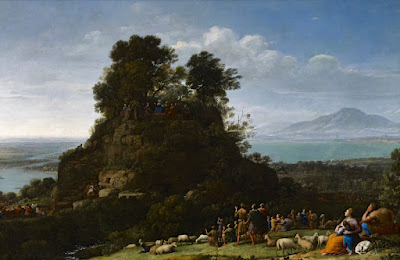This week, my good friend and brother, Fr. Cristiano Barbosa and I returned to St. John's Seminary to say "goodbye" as we conclude our full time work there. Fr. Cristiano offered the Mass and I preached.
Homily on the Memorial of St. Vincent DePaul
St. John Seminary
September 27, 2023
“Whatever house you enter, stay there and leave from there.”
“Enter. Stay. Leave.” So much of priesthood is lived in these three movements.
Enter:
The priest enters into the lives of people. It really is astonishing the places the Lord allows us to enter. The people to whom we are sent welcome us to enter into their families and into their homes. They welcome us to enter into their life of prayer, into their temptations and into their sins, and into their joys and into their sorrows. People want priests who will draw close to them and enter into their lives.
Stay:
The priest stays with people. He stays with those who are searching, struggling, suffering, or stumbling. He stays with them and walks with them. He stands at their side. He stays and lifts them up when they have fallen. He even, at times, stays with them in order to carry them. He stays with them to feed them with the Eucharist and to console them with the truth. He stays with them when their life is falling apart. People want priests who will stay with them.
Leave:
Although he enters and stays, the priest also leaves. He leaves because–although he does indeed prolong the presence of the Good Shepherd in the midst of the flock–he is nonetheless, not THE Good Shepherd. He leaves because one sows and another reaps. He leaves because nothing belongs to him. He is entrusted for a time with a particular corner of the Lord’s vineyard. Then, like the apostles before him, he moves onto other villages to enter, to stay, and to leave. People want priests who will leave them in the secure knowledge that they have been loved.
Three years ago, Fr. Cristiano and I entered this house. I know I speak also for him when I say how grateful we are to the Lord that we were allowed by him to enter into your lives. We are grateful that you welcomed us, that you opened your hearts to us, and that you shared your life with us.
We were privileged to stay with you, to live closely to you, to be near you in your joys and in your struggles. To stay in prayer with you and–even now– to stay in friendship with you.
And, of course, now we leave. But even this is a privilege. Because we leave only to wait for you to join us in the vineyard. The harvest is abundant, but the laborers are few. The seminary itself is a place to enter, to stay, and to leave.
All of you, like the apostles, were summoned here by the Lord. As you enter into another year of formation, to stay with each other, and to prepare to one day leave for priestly ministry, I’d like to offer one piece of advice. The most important thing you can do in the seminary is to grow in love. A priest who loves is a priest who will do amazing work. A priest who loves will be joyful and will attract people to Christ. People are starving to encounter real, true, authentic, and pure love. Do everything you can to become men of extraordinary charity. Avoid petty dramas, rivalries, contention, ambition, and bitterness. These things make the heart small and they destroy love and joy. Shake such silly dust from your feet. Instead, put charity above everything else. Love one another here and now. That is the best preparation for priesthood.
Doctrinal purity, yes. Liturgical exactness, yes. Homiletic excellence, yes. But, the most important thing you can do now to prepare for your future priestly ministry is to burn with love for God and for one another. St. Vincent de Paul knew this. He said that the priest was called to inflame the hearts of men, to do what the Son of God did; to set the world alight with the love of God.
If everyday–here and now–you grow in your love for God and for one another, you will one day enter the lives of your parishioners, you will stay close to them, and you will leave them all the better because in and through your priestly ministry, they will have encountered the Incarnate Love of God Himself, Jesus Christ, the Good Shepherd.

